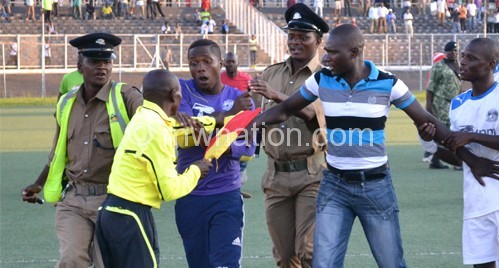‘Referees have no case to answer’

Despite the media reporting about several complaints clubs levelled against referees during the 2013/14 season, the National Football Referees Committee (NFRC) says it received no official complaint to necessitate disciplining any of its members.
NFRC president Patrick Kapanga said some referees might have taken advantage of clubs’ laxity to handle the games unprofessionally.
“There is no way we can act on hearsay,” said Kapanga on Wednesday. “Every complaint needs to be supported by evidence for us to promptly deal with matters levelled against our referees. We only hear and read about our members’ purported poor handling of games in the media.”
He said the media is not a valid platform from which his body can pick out complaints for disciplining suspects as provided for in their constitution.
Super League of Malawi (Sulom) general secretary Williams Banda, whose body is supposed to take clubs’ complaints to NFRC, agreed with Kapanga that during the season teams just made verbal protests against officiation.
But teams such as Mighty Wanderers, Silver Strikers and Blue Eagles argued this week that they do not complain officially about bad officiation because of loss of trust in both NFRC and Sulom.
They claimed that they let life go on because the two bodies do not punish the offenders.
“We realised it was better to concentrate on preparing for our games than wasting time to write complaints that would not be honoured. We all know the quality of our referees is poor, but have you ever heard of them being punished for their misconducts?” asked Nomads general secretary David Kanyenda.
Kanyenda, his Silver Strikers counterpart Mike Tembo and Blue Eagles coach Deklerk Msakakuona said in separate interviews that this is probably why sometimes club officials, players and fans resort to manhandling referees during matches.
Incidents that marred the game during the season include the beating up of a fourth official at Kamuzu Stadium in October by a Blue Eagles player who was on the bench. The official’s crime was that he showed a controversial six-minute added time. Bullets went on to win the game 3-2 in the added time.
In November, police fired tear gas at fans who had invaded the pitch to jostle referee Dennis Nguluwe for giving Wanderers player Diverson Chilemba a second yellow card in a game against Red Lions that ended 1-1.
During the same match, Nomads coach Stewart Mbolembole was restrained by stewards and police from confronting the referee.
But Kapanga argued that they do not hesitate to punish referees they find on the wrong side of officiation rules. He, however, insisted that such action is taken after getting enough evidence.
He gave the example of Mabvuto Godoya’s recent demotion from grade one to two and suspension for six months. He said NFRC took the action after proving beyond reasonable doubt that Godoya messed up the Bullets versus Moyale match at Mzuzu Stadium.
Instead, Kapanga accused Sulom of fuelling abuses against referees by failing to act on their complaints against bad remarks from coaches and club officials.
“One club official described all Lilongwe-based referees as mbuzi [goats] after his team lost. We reported the matter to Sulom with evidence included, but nothing happened.
“If it were in other footballing nations, such a statement would have earned that official a hefty fine or ban because referees are not supposed to be intimidated,” said Kapanga.
But Banda said the duty of disciplining club officials lies with the National Football Coaches Committee, which is under the Football Association of Malawi (FAM), just like Sulom and NFRC.
“We would be jumping the gun if we take measures against scornful coaches because they fall under the coaches committee. Our football structures were designed not like those in the English Premier League where all complaints go directly to the mother body.
“Nevertheless, we will sit down with the Sports Writers Association of Malawi (Swam) to ensure that journalists take out scornful remarks in their interviews with club officials,” said Banda.
But, overall, he said ethically, referees handled games poorly during the season.
He decried the tendency of assigning some referees to several matches involving particular teams, claiming the practice exposed the referees to abuse by some clubs.





